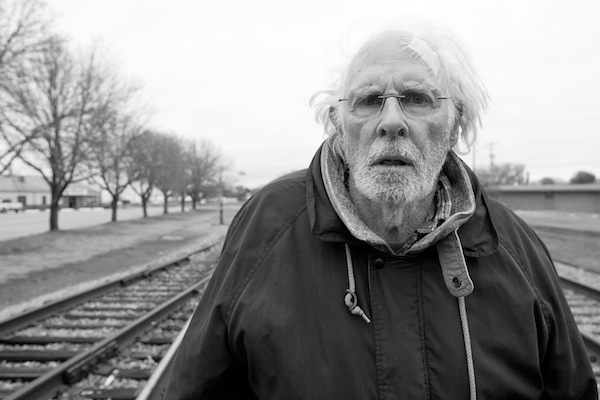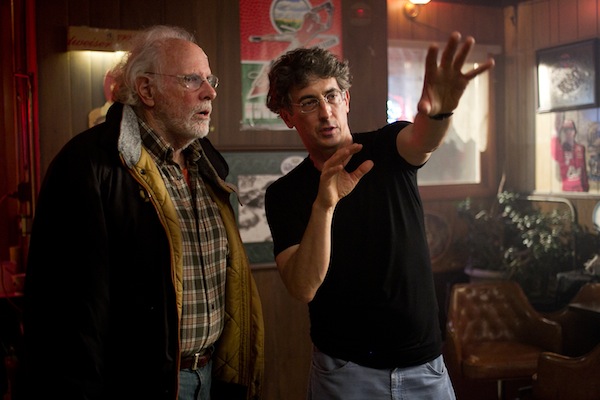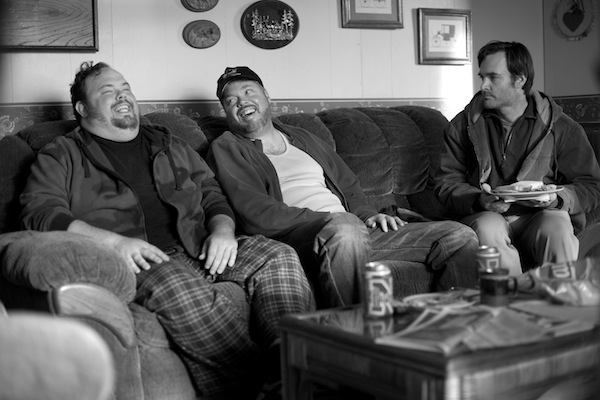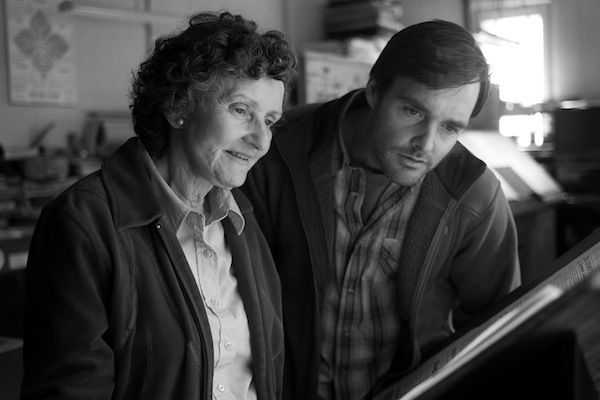Woody Grant is convinced that he will finally be lucky in life. From the sweepstakes notice he has received in the mail, Woody believes that a million-dollar prize is his for the taking — if only he can make his way the 750 miles from his home in Billings, Montana to Lincoln, Nebraska, to stake his claim. Woody is so determined to collect his prize money that when we first encounter him in Alexander Payne’s film Nebraska, he is along the side of a highway, walking there.
Bruce Dern (Coming Home, Django Unchained) campaigned to be cast as the taciturn Woody Grant in Alexander Payne’s film, a role which has already brought him good fortune. Dern was awarded the coveted Best Actor prize at the 2013 Cannes Film Festival for his portrayal, and if his luck holds out, he may yet receive an Academy Award nomination for his stark and monumental performance. “I’ve never been given a role this fabulous in my entire career,” Dern states. Like his character Woody, Dern seems to be determined to go the extra mile, to claim the long awaited prize.
Nebraska is replete with carefully observed acting performances. Comedian Will Forte (Saturday Night Live) is cast against type, as straight man David Grant, Woody’s son. “Will communicates a ready sincerity and sweetness, and also a sense of damage,” Payne explains. June Squibb (Alice, About Schmidt) plays tart-tongued, abusively loving wife and mother, Kate Grant, in a performance that is unapologetically blunt and painfully hysterical. Stacy Keach (American History X), as Woody’s former business partner, Ed Pegram, is by turns charming and menacing, and brings down the house with his Karaoke version of “In the Ghetto.” There is not a false note in the entire ensemble; first-timers blend naturalistically with seasoned professionals.
Producer Albert Berger has observed that Payne “casts his locations as carefully as he casts the actors.” For the fourth time in a film, the director features his home state of Nebraska in the lead. Cinematographer Phedon Papamichael captures the spare essence of the state’s open landscapes and towns frozen in time using anamorphic lenses and black and white.
Nine years ago, producers Albert Berger and Ron Yerxa, with whom Payne had previously collaborated in making Election, sent the screenplay Nebraska by sketch comedy writer Bob Nelson to Payne. Payne could relate to the unsentimental story of a son who so deeply desires to preserve the dignity of his father: “My parents are getting on and it’s a question that affects me because I’d also like them to grow old with complete dignity. Old age can diminish us, and make us lose our dignity. We have to hold on to it,” he explains.
A quixotic quest for forgiveness, Nebraska is a modern day family odyssey, at once humorous and melancholy. “I have never been this blessed with a director,” lauds Dern. “I’ve worked with several geniuses in my career – Kazan, Hitchcock, Trumbull, Coppola and Tarantino – and Alexander Payne just joined the list.”
I had the opportunity to listen to the animated and enchanting Bruce Dern pontificate on his approach to acting and his working relationships with director Alexander Payne and actor Will Forte in a roundtable conversation with his co-star Forte at the Ritz-Carlton San Francisco Hotel when the film premiered at the Mill Valley Film Festival.

Bruce Dern as Woody Grant in NEBRASKA. Photo by Merie Wallace.
Q: Bruce, how much of your preparation to play Woody harkens back to your training at the Actor’s Studio?
Bruce Dern: For me, there were three goals: go to New York, work for Kazan, become a member of the Actors Studio. I quit college in Philadelphia, and I went and did just that. I was under contract to Mr. Kazan with Rip Torn, Geraldine Page, Lee Remick, and Pat Hingle. It’s not an illustrious group in terms of fame in the business, but everyone could bring it — even Lee Remick, older in life she got really interesting. Gerry is as good as I’ve ever worked with, Rip can be fantastic when he behaves himself, and Pat would have been a great Woody if he was in the age group.
My first year at the Actors Studio, I was never allowed to do a scene with any dialogue. I was just a quiet partner. Strindberg, whatever it was — you’d work on scenes where the character didn’t speak. I’d never acted before, and they wanted to train my instrument first. I was trained about behavior, using Bruce [myself], as a foundation. It’s the best foundation for any actor. I just learned how to really look at you and react, get involved.
Immediate — immediate identification the minute you look at somebody. “Gadge” [Elia Kazan] and I used to have an exercise: we’d be walking down a street and he’d say, “Look at her.” [One-thousand one, one-thousand two, one-thousand three.] …”Now look away and tell me what you saw.”
[Referring to Sophia Stein] “Well, I saw a girl with glasses, a beautiful face, long hair, could be Indian/could not, don’t know quite what she is? Could be a Israeli maybe?” Then he says, “Okay, look at her again.” Well, now I’m just looking at her back, ’cause she’s halfway up the street. It was an invasion of their privacy, but from my point of view. So you learn to take advantage of a gift that you’re given. Everybody can do it, which is — “What do you see?”
When I meet somebody for the first time ever, no matter who it is, I ask, “Where did you go to high school?” If they say, “I went to Wyandotte” — I know Kansas City; “I went to Boys High” – I know Brooklyn. That gives me an entrée to people right away. Will told me that he always gives Moraga a plug first and then goes to Lafayette where he attended High School [in the San Francisco, East Bay].
I do that privately with people, without actually saying anything to them. That’s just part of what I call my technique. It’s invading who you really are.
[To Sophia Stein] Are you Indian at all?
Stein: I’m not Indian, at all. Just a Jewish girl, from North Haven, Connecticut.
Dern: When I was growing up, I lived in Winnetka, Illinois. After the war, Jewish people moved out to the North Shore and settled Highland Park and Glencoe. So, all my best friends were Jewish kids growing up. The one thing I learned, more than anything else, was that Rabbis have the best looking god-damned wives I’ve ever seen in my life. Just sensational. They all look like Miss. Israel to me. The most unique moment I’ve ever seen in a film (and I’m a guy who looks at film for unique moments), is in Marathon Man, when that woman looks across the screen and says, “Mengele.” That, to me, is the most riveting moment. And the most unriveting is — when Robby Benson went to do that movie where he’s an Orthodox Jew playing basketball at the high school.
Will Forte: For a minute there, I thought he was going to reference something in “MacGruber.”
[Enormous laugh.]
Dern: Arthur Miller once told me, “There’s so much ‘I’ in the world of acting.” I took it from him and based my approach to acting on the reverse. In our Alexander Payne film, there is no ‘I.’ There’s no ‘I’ in the word “team,” and you’re a team player. Alexander gives you the best teammates you can have. (I mean, that’s a pretty good cast in that movie that we made!) Everybody pulls their oar about as good as they’ve ever done. (Hopefully, including myself.) Alexander makes you do that — because he provides you with a comfort zone, that you’re in a family.
Normally you might think, “I’m looking at you, and I’m wondering who you are.” Not Woody. Woody thinks, “Who do you think I am?, What do you think I’m up to?, Where do you think I want to go?, Where do you think I’ll end up going?”. So right away you’re working with that character, that personality, asking the same kinds of questions we ask in real life about everybody.
A guy wrote a book in the ‘60’s, Stroking, and it was about —
[Bruce Dern instructs Will Forte to take his hand. Looks into his eyes.]
Dern: Hi.
Forte: Hi.
Dern: How are you?
Forte: I’m good. How are you?
Dern: “Okay.” See, I forced the issue. I say, “Hi,” and he had to say, “Hi” back. Then I like him enough that I go the next step: “How are you doing?,” and he answers back. That’s called “stroking.” That’s what you have to do as an actor; you have to bring each other out.
But Woody doesn’t do that. Woody’s not a “Hello, I’m here,” kind of guy. Will comes in [as my son David], and he’s immediately denying what the rest of my life is all about, trying to take it away from me. I blame my wife because she won’t take me [to Lincoln, Nebraska, to claim my prize money]. So immediately you get Woody’s paranoid reaction. The purest line in the movie is “Well, then why don’t you take me!?!” David’s answer, is “You know; I’ve got shit to do, I’ve got a busy life.” –“Oh yeah, really?! Give me a break! You couldn’t get laid with a hundred dollar bill.” The quicker you can make it personal, the more real it’s going to be to the audience.
A couple years ago, I got tired of performing. I just wanted to be a human being in movies from now on. I want an hour and forty-five minutes of moment-to-moment behavior. That was my beginning, at the Actors Studio. Stanislavski’s all about moment-to-moment behavior. (I can’t even spell his name, but I know he was up to something a hundred years ago.)

Bruce Dern and Alexander Payne on the set of NEBRASKA. Photo by Merie Wallace.
Well, a lot of times in filming this movie, Will and I would be together in a car for about six hours without getting out of it because the rigs are on the car so you can’t open the door. So I had to pee in a bottle!?! There was no way out, you know. Alexander knew exactly what he was doing. He encouraged us to stay. If I’d have gone to my dressing room, Alexander would have said that was fine, but he liked it better that we were stuck together. That paid off, and Will picked up on that immediately. Will is the lynchpin to the movie, as I have been saying all year.
At the very beginning Alexander Payne said to me: “This is Mr. Papamichael; he’s the cameraman, I’m your director. Do something for us you’ve never done in your career that we know of.” “What’s that?,” I asked. “Let us do our jobs,” he replied. In essence, he was saying, “When people turn this switch on you in your career, you bring it pretty quickly, pretty specifically, and entertainingly. Do Mr. Papamichael and I a favor — don’t show us anything, let us find it.”
When I go out of the kitchen into the living room and they continue playing the scene in the kitchen, the camera’s on me. You can’t act that; you’ve just got to be. When your director is your partner like that and gives you an opportunity to be a real person, you got to hug him and go with it every single day.
Will got it right away. And it’s not easy! When Jack Nicholson saw the movie, Nicholson said, “That kid’s like a humorist or something, isn’t he? I see him on Saturday Night Live, and he does all that stuff.” “Where was that in the movie?,” Nicholson asked. “That was taboo,” I told him. “Both from me and from Alexander.” Will just behaved, instead of acting.
Will hasn’t gotten nearly the supporting actor accolades right now that he deserves. Will Forte should be on every list — not just because of the performance, but for what he dared to do as an actor, which is sacrifice his natural instinct for comedy, not go for the jokes, and just talk to me. If you don’t just say it, the way it’s meant to be said, if you start performing it, or trying to get the joke, you ruin Alexander Payne’s movie.
The two brothers do it excellently — and they didn’t even know what they were doing! The one kid’s just a local Omaha actor [Tim Driscoll]; the other kid, Devin Ratray, was in Home Alone.

Devin Ratray (Cole), Tim Driscoll (Bart) and Will Forte (David Grant) in NEBRASKA. Photo by Merie Wallace.
Q: After the scene where they’re discussing you in the kitchen as if you don’t exist, as if you have no say in your own life, and you’re sitting on the couch, what was going on in your head during that scene?
Dern: Well, Woody doesn’t hear that stuff. I mean, how many times can I say “Huh?” in a movie. And how many times can he say, “Dad!,” “Dad!!,” “Dad!!!”
Forte: I say, “Dad” a million times!
Dern: That’s one of the easier things about playing Woody; Woody’s distracted because he doesn’t get it. He’s got like I’ve got — one of these [hearing aids] in each fucking ear, otherwise I don’t hear. I can’t hear a bird. I can’t hear when the Dodgers scored two in the second inning last night … (‘cause I was in the screening at the Mill Valley Film Festival!)
Director Alexander Payne gives you an opportunity to do what you’ve waited all your life to do as an actor. Payne makes films, but in this case, I felt I was in an opera. I’m a guy who loves opera in life, absolutely. I wouldn’t sit through a fucking opera [at the Met]. But when we all stand in a ballpark and sing the anthem — that’s opera. The opening of the Olympic Games — is opera. When you go certain places — that’s opera.
Alexander is a guy who has the courage to put eight guys in a room in a semi-master close-up watching a football game for four minutes, and there are only forty words spoken between them, and it works. Back there, every one of those families has that! I come from one that wasn’t back there that’s the same way. The long pauses — you’ve been there, I’ve been there. It’s those pauses! And Alexander dares to shoot the pauses.
The only other guy like that who I worked with a lot was Bob Rafelson. You look at Marvin Gardens or Five Easy Pieces, it’s those pauses. When Jack goes out at the end to talk to his father in the wheelchair, he says very little, and the father says nothing ‘cause he’s had a stroke. Well, that just breaks your heart.
Rafelson made a wonderful movie nobody ever saw called Mountains of the Moon, about Captain Richard Francis Burton’s expedition to find the source of the Nile river. There are pauses in there that are great! — but shit, man, you’re in the middle of Tanganyika or whatever it was called, and there’s nothing out there! And there’s nothing in Nebraska!! Which is why the film is shot in black and white. Woody is a monument to a kind of man (rarely left in this country, rarely given any attention anymore) — guys who believe what people say, and who are fair. If there’s one thing I have to say about Woody, more than anything else — he’s a fair man. He believes in fairness. When you don’t bring that, he wants you gone.
Q: Bruce, you had commented that you never really had much of a relationship with your father, but that by the end of the movie, you thought that you had found your father through Alexander.
Alexander encouraged me. When I met Alexander, in the course of seven weeks, he said every single thing I wanted a father to say to me. I was a speed skater first and a runner and so forth, and my parents would never come to the things, but Alexander comes to my track races. Not only that, he’s not at the fucking monitor in the back of the stage with the grips and the guys betting on the Laker game. He’s right there with you. If you miss [something] — I don’t know how many times Will and I would finish a take in the car and just dread which side of the car Alexander was going to visit with notes. Alexander dares you to risk.
The first day on the set, I told him, “I’m just amazed that everybody’s pulling their oar, opening day, before lunch even! Everybody behind the camera is pulling their oar as much as we’re trying.” And Alexander said, “Well, 38 of my 80 person crew have worked every day, on every film I’ve ever made.”

Angela McEwan (Peg Nagy) and Will Forte (David Grant) in NEBRASKA. Photo by Merie Wallace.
Dern: I’m sorry to go on so. Ask Will one question, please. [To Will.] Let her ask!
Forte: No, this is how I prefer it.
[Forte’s punch line earns a big laugh.]
Forte: This is what is was like for the entire time we were there, which I wouldn’t change a thing. It was hearing the most delightful stories of all time while we’re waiting to act. Then we’re acting, and Woody is the exact opposite person. All of a sudden, he barely says a word. To get to experience this special performance, to be this close to Bruce, a foot away from him most of the time, is an experience I’ll never forget. To hear him compliment me the way that he does is something I’ll take with me to my grave. I could not have more respect for Bruce Dern as an actor. Going in I had a tremendous amount of respect, but getting to know him as a person while we were making the movie, we’re like family now.
Dern: Oh, that’s sweet.
I remember when Laura and I and the mother got stars on the Boulevard. Joe Dante introduced me — because he’s my friend, he’s funny and he can bring it. He directs. People forget some of those early movies – Explorers, The Howling, Piranha. Della Reese introduced Miss Diane [Ladd], and David Lynch introduced Laura [Dern].
There’s two-thousand people in the street. Everybody else down the street is pissed off: “Get those fucking people out of the way there. They’re holding the light at the corner for three people I’ve never heard of!” So you’re a little embarrassed about that, and then they’re giving the thing. It was quite sensational because we were the only family to ever be honored like that — mother, father and child. (–There had been other families; I’m not a Barrymore.) But I mean, we did good!
“Nebraska” opens in limited release in theatres on November 15, 2013.
“Nebraska” Official Website.
Top Image: (Left to right) Bruce Dern, Alexander Payne and June Squibb on the set of NEBRASKA, photo by Merie Wallace
All images from Paramount Vantage in association with FilmNation Entertainment, Blue Lake Media Fund, and Echo Lake Entertainment. Photo Courtesy of Paramount Pictures, © MMXIII Paramount Vantage, A Division of Paramount Pictures Corporation. All Rights Reserved.
Sophia Stein writes about film and is a regular contributor to Cultural Weekly. Stein studied production at USC School of Cinema-TV. She worked as a Hollywood development executive, editing assistant and post-production supervisor. Currently, she resides in the San Francisco Bay area. She appreciates most those films that make her think, as well as laugh or cry.
